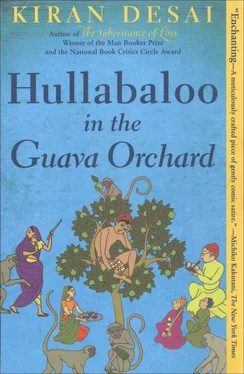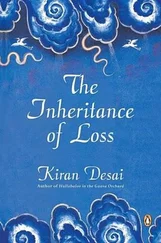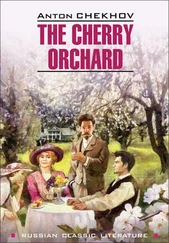‘Baba, why are we so aggressive and greedy sometimes, when at other times we are just happy to sit beneath your tree?’
‘On a hot day the bee buzzes louder, on a rainy day it sits quietly in its hive,’ answered Sampath.
Though he wrote down everything he heard religiously, the spy had given up trying to understand Sampath. The more he saw, the more he was convinced that the secret of Sampath’s presence, his odd words and antics, would be found in Kulfi’s cooking pot. More determined than all the rest, he tried again and again to sneak past her in an attempt to collect a sample of her food in a bottle he had provided himself with.
But each time, as if she had been forewarned, Kulfi caught sight of the spy just in time and cracked him over the head with a broom. You could get yourself killed in the BUFHM, he thought, and watched from the bushes as she continued her work, slicing vegetables with vigour, beheading chickens and geese with nonchalant blows of her hatchet. But still, the more his efforts were thwarted, the more suspicious he became. The minute her back was turned again, he could not help but make one more attempt …
What with all the trouble Sampath’s meals were causing, Mr Chawla decided to allow visitors only between the hours of lunch and dinner, between half-past noon and half-past eight in the evenings.
With limited access, the popularity of Sampath and his hermit-like reputation grew. However, the trick of limited access could not be applied when the monkeys arrived.
‘Look,’ Pinky yelled one day soon after the visiting hours had been put into effect. ‘It is one and the same monkey who chased us in the bazaar.’
‘Look,’ chortled Sampath from his superior look-out position, ‘a whole band of them!’
‘That monkey is following me,’ Pinky shrieked. ‘Everywhere I go, it goes.’ She turned to glare at her brother. ‘Why are you so happy to see them?’
How could he not be happy? A whole cluster of interested silver-fringed black faces peered at him prettily from between the leaves of the neighbouring tree.
‘Haven’t I told you, Pinky, nobody is following you,’ said Mr Chawla yet one more time.
But what did he know of the nasty qualities of these monkeys?
‘Wait and see,’ said Ammaji, showing a warning flash of lurid yellow between her lips. ‘There will be trouble. You can see it in their faces.’
Kulfi slapped some wet clay on to a bird pierced with cloves and threw it into the open fire to cook. The air filled with smoke.
‘Wait and see,’ repeated Ammaji darkly.
And it was not long before the troupe from Shahkot, presided over by the Cinema Monkey, became regular visitors to the fields and forests surrounding the orchard. They rarely ventured out of town and people wondered why they’d made this trip up the hillside — had even the ape community obtained news of Sampath and organized a visit?
The monkeys, when they first arrived, looked upon Sampath, the strange sedentary member of another species they had spotted up in their usual domain, with some trepidation and maintained a wary distance, baring their grotesque and discoloured teeth, pulling faces, chattering in a scornful show of contempt and derision. Unbothered by their mocking, glad of yet another distraction, Sampath turned their dirty game right back on them and hooted and howled. ‘Hoo hoo,’ he cried, rolling his eyes, puffing out his cheeks in a way that seemed to cause mutual satisfaction, for these antics continued and soon the monkeys drew closer, extended their dirty wizened palms and nudged Sampath, at first gingerly, to see how he would react, and then with a great rude push once they decided he was not a threat. And how he could contort his face! A look of being very impressed showed across their monkey faces.
They looked even more impressed when they had spent long enough in the orchard to identify Sampath as the nucleus of this bountiful community they had come upon. Funnily enough, all the food in the orchard seemed clustered about this hooting boy who possessed qualities that, though not admired in them, seemed to be greatly appreciated in him. No doubt, the closer a human was to a monkey, the more presents he was given: the freshest fruit, the best nuts, were brought to Sampath’s feet. He was not merely accepted, then, but endowed with elevated status within the monkey hierarchy. Through him they could receive the tastiest titbits. Before he knew what was happening, he was sharing his string cot with the cinema bully himself. Propped up simian-style against each other’s backs, they awaited visitors in this their shared state of splendour, for no longer did the troupe spend its time scavenging in the market, stealing from the shopkeepers, terrorizing the likes of Miss Jyotsna and Pinky. Why would they do that, when they had realized soon enough that they could obtain their meals much more easily by sitting near Sampath and receiving the kind people who drove up for the express reason, it appeared, of bringing peanuts and bananas?
Fondly, the lady monkeys groomed Sampath as he sat, secretly pleased but shouting, ‘Ow, don’t pull my hair like that,’ and swatting them. But, with amused, sly faces that looked as if they understood he was playing a little game, they circled back after being chased away to continue their attendance upon his glossy and shining locks, which, to their credit, grew even shinier and glossier with their care. Sampath enjoyed this attention more and more as he became used to the occasional tug or scratch.
‘Look at that,’ said Miss Jyotsna, who, like Pinky, had let out a shriek when she first identified the ape who had humiliated her at the cinema. ‘Clearly he has charmed the monkeys.’
They sat grouped about Sampath like a silver-haired and graceful bodyguard, yawning and scratching at their beautiful selves. Almost all the ladies had a story, second-if not first-hand, of torn saris and petticoats, and they marvelled: ‘Look at that monkey. Gentle as anything! The Baba has subdued the beasts.’ A priest visiting from the church in Allahabad was reminded, he said, of St Francis of Assisi, who was always depicted so touchingly surrounded by creatures of the forest.
The behaviour of the monkeys was just another proclamation of Sampath’s authenticity. ‘Think of all those shams said Miss Jyotsna, ‘all those crooks posing in their saffron, those gurus who are as corrupt as politicians …’
Oh, they gloated, their Baba was not like that. He was an endless source of wonder. He had even cast his spell upon the wild beasts of the market.
‘Hmph,’ snorted the spy, who was, to tell the truth, a little unsettled by this new occurrence. ‘No doubt it is just well-developed human — monkey interaction,’ he said.
‘Human — monkey interaction,’ said Miss Jyotsna, highly offended by this disrespect being paid to her old colleague. ‘Go ahead, brother, you try your hand at human-monkey interaction and get sent to hospital covered with monkey bites.’
But though some of the visitors were happier about the monkeys’ arrival, seeing Sampath’s effect upon them, Mr Chawla thought his mother’s instinct had been accurate right from the start and he mourned his clever trick of selling and reselling the offerings provided by the visitors. Those greedy monkeys ate everything they could grab and run away with.
Kulfi grew worried about her kitchen and began to store her things away more carefully.
And Pinky, too, unelated by this onslaught of apes, was reminded of the insuperable Kwality Hungry Hop boy every time she saw them and consequently, several times a day, she burst into hysterical tears.
Ever since her encounter with the Hungry Hop boy over the denture affair in the bazaar, Pinky had gained a new feeling of compassion for her brother. This was not a feeling she had ever had before; it was different from the exasperation or amusement she had usually experienced in relation to him. But one morning she had looked up at his feet dangling from the cot and realized that they must surely have hit upon a similar vein in the state of things. No doubt, weighed by the same concern with fragility, inevitability and doom, Sampath had been driven up into the branches, away from this painful world. She remembered his face as he was going to school, how he would always try to climb up on to the roof to be alone when he came home, and she felt terrible about how she had harangued him, shouting up the stairs … Now, she felt, she too understood the dreadfulness of life, recognized the need to be by herself with sadness, and from this moment of realization onwards, she spent hours sitting under Sampath’s tree, in a private cocoon within which she indulged her every thought, wrapping herself in endless imaginings, endless ruminations, snapping in quite an uncharacteristic way if she was interrupted.
Читать дальше












